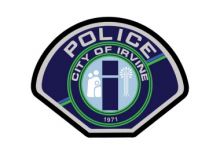Irvine, Calif. (April 18, 2018) – The public’s perception of police is impacted by attire and other factors, a recent study found. The Irvine Police Department (IPD) partnered with University of California, Irvine doctoral candidate Rylan Simpson to examine how attire and patrol strategy esthetics impact people’s perceptions of the police. Simpson’s Police Officer Perception Project, or P.O.P.P., was published in the Journal of Experimental Criminology, with a second article featured in Policing: A Journal of Policy and Practice. His findings are summarized in a short video produced by IPD that can be seen at https://youtu.be/X2KOedgt5Lk.
For his study, Simpson presented images of police officers in different attire and engaged in different patrol strategies (i.e., in a patrol car, on foot, on a bicycle). The subjects were not aware of what researchers were studying when they viewed the images. Participants were asked to describe the officers seen in the images as “aggressive,” “approachable,” “friendly,” “respectful” and/or “accountable.”
Participants expressed relatively positive perceptions of the police, said Simpson, who is part of UC Irvine’s Department of Criminology, Law and Society. However, their perceptions were influenced by the factors Simpson studied. Generally, police officers are perceived more favorably when presented in police uniform than when they are in street clothes.
“Merely observing police officers in different attire produces substantial variation in perceptions of them. Like laboratory coats in academia, white coats in medicine, and robes in law, uniforms are important symbols of legitimacy in policing,” Simpson said.
Study participants also responded more favorably to police who were on foot or who were riding a bicycle, versus those in a police car, Simpson found. Additionally, officers wearing sunglasses or black gloves or those carrying batons were seen more negatively, whereas those wearing high visibility vests were seen more favorably.
The partnership between the Irvine Police Department and UC Irvine on this study was emphasized by Chief Mike Hamel.
“The ability for law enforcement practitioners to partner with researchers is extremely important. When Police Departments and institutions of higher education collaborate, such as the relationship we have with UC Irvine, there is great potential to answer many important questions about the criminal justice system and the nature of policing, with the ultimate goal of providing better service and enhancing our credibility,” said Hamel, who is also a graduate of UC Irvine.
To read Simpon’s articles, go to https://link.springer.com/article/10.1007/s11292-017-9292-4 or https://academic.oup.com/policing/advance-article-abstract/doi/10.1093/p.... For more information, email simpson@uci.edu.
###

